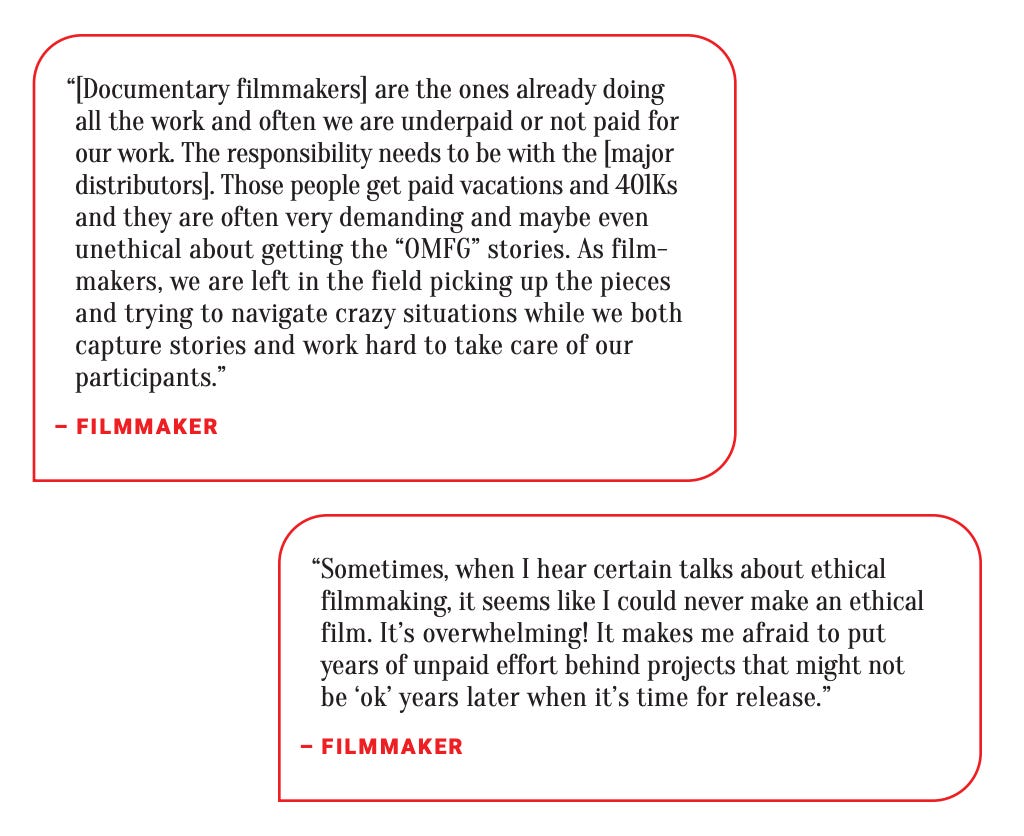Filmmakers and Participants: Why This Study Matters
An uncomfortable, and necessary, read for every documentary filmmaker
Storytelling is built on relationships. As filmmakers, we step into people’s lives, often in their most vulnerable moments, and ask them to trust us with their truths. It’s a responsibility that demands care, humility, and accountability. That’s why I believe the study recently released by ITVS, “Exploring the Filmmaker-Participant Relationship,” is so important—and why I want to encourage you to read it in full.
This groundbreaking study dives deep into the nuances of the relationship between documentary filmmakers and their participants. It asks critical questions:
How do we as storytellers balance the power we hold with the obligation to protect those whose stories we share?
How do participants feel about the filmmaking process, and what can we learn from their perspectives to ensure our work uplifts and respects them?
The report explores these dynamics through real-world case studies and participant interviews, offering a thoughtful look at the challenges and ethical questions that come with documentary filmmaking.
For me, this report feels deeply personal and extremely overwhelming. My work often involves long-term collaborations with people in rural communities—particularly Appalachia—where trust takes time and relationships can stretch across years. One of the most impactful parts of the study highlights how essential transparency and reciprocity are in these relationships. It's a reminder that documentary filmmaking isn’t just about getting the story—it’s about building trust, creating space for people to feel seen, and being accountable for how our films might affect their lives long after we’ve packed up our cameras.
The study also brings to light something we don’t talk about enough: the emotional labor that participants take on when they open their lives to us.
What does it mean to share intimate parts of yourself, knowing they’ll be shaped into a narrative for the world to see?
Are we, as filmmakers, doing enough to consider the impact of our work on the people at the heart of our stories?
This isn’t just a report for filmmakers—it’s for anyone who values the power of storytelling. Whether you’re a filmmaker, educator, student, or someone who loves documentaries, the insights here will make you think critically about the ethics of storytelling and the power dynamics inherent in the craft. It’s an invitation to reflect, to learn, and to do better.
Below are some main points that really stand out to me.
The Filmmaker-Participant Relationship: Key Context
Explores the power imbalances between filmmakers and participants.
Examines how participants view their involvement in documentaries.
Highlights the need for transparency, trust, and accountability in these relationships.
Challenges in the Relationship
Power Dynamics: Filmmakers control the narrative, which can leave participants feeling vulnerable.
Consent and Agency: Ensuring participants fully understand and agree to their role.
Emotional Labor: The toll of sharing personal stories, especially around trauma, and the lasting impact of public exposure.
Building Trust and Reciprocity
Trust: Be transparent about your intentions, process, and goals.
Reciprocity: Find meaningful ways to give back to participants and their communities.
Accountability: Stay connected with participants after the film is released to ensure they feel respected.
Recommendations for the Field
For Filmmakers: Prioritize participant well-being, create clear ethical practices, and approach storytelling with humility.
For Funders/Institutions: Support filmmakers with training and resources to navigate ethical challenges, such as trauma-informed practices and contracts.
I hope you’ll take the time to read this report. Let it sit with you. Let it challenge you.
Click here to access the full report.
Let’s keep the conversation going. I’d love to hear your thoughts—how do you approach the relationships in your work? What practices help you navigate these spaces with integrity? Share your perspective in the comments or reach out directly. This is the kind of dialogue that can make our community stronger.






I find this so true, beautifully expressed, and helpful! When watching your films, I feel the meaningful moments along with participants, and I sense the trust and respect that’s necessary for such moments to be recorded.
A few years ago I finished a solo film with interview subjects who I only had fleeting contact with while traveling around the U.S. So this was very different from following the lives of participants over time. I felt protective of the people who spoke on camera, and have kept a promise that they can let me know if they prefer not to be part of my project and I will remove them. So far no one has asked to be removed, and I maintain peace of mind, but if I had funders, a distributor or insurers, this conditional arrangement wouldn’t be possible. Of course there’s a sizable downside to having no funders or distributors - few people see the work, and it’s not financially sustainable. But it’s been a valuable discovery for me to experience the weight and responsibility of presenting people on screen within a genre that sets expectations for truth.